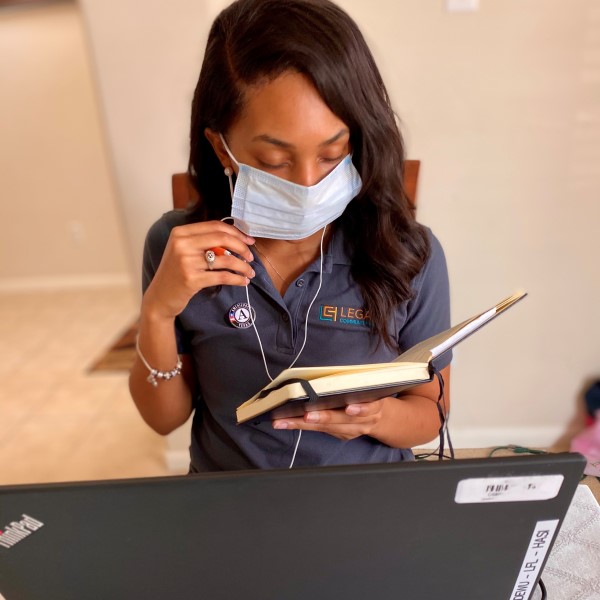“It is not just one family who is experiencing this—there are more stories like that here. Now that a lot of people are losing their jobs, the uncertainty is growing. I hope that all of us AmeriCorps members become a beam of light in these trying and desperate times.”
Sara Shams
AmeriCorps Community Health Advocate
Legacy Community Health
When COVID-19 emerged in the Houston and Beaumont area, Legacy Community Health was at the forefront of the local public health response and was one of the first organizations in the city to provide widely available testing to the community. Legacy serves 130,000 low-income patients regionally, many of whom have limited affordable healthcare options, and the organization has strategically deployed its AmeriCorps program to better serve these vulnerable populations.
“Moving forward, I think AmeriCorps members are going to play an increasingly important role in the in the services that Legacy provides the community,” said Jack Winn, Director of Grants and Programs. “It feels like every week is different than the next. As the weeks have gone on, our members have seen increased needs from individuals who were spending their time and energy worrying about the virus but are now suddenly realizing life has to go on.”
Legacy’s AmeriCorps members work with local communities to address social determinants of health—any factors that might impact an individual’s ability to live a healthy life and access quality healthcare. This encompasses a wide range of issues, including food security, housing and utility assistance, and access to transportation and technology to ensure medical appointments are kept. In the wake of the coronavirus, these needs have been magnified and become even more urgent.
“I thought I was ready for the new changes due to COVID-19, but I believe that it was not what any of us had expected,” AmeriCorps member Sara Shams said. “As I work mostly with immigrants and refugees, I realized that they feel a great deal of fear and anxiety. Imagine coming to a new country during a pandemic and a quarantine lock down, and you don’t know what to do or where to get help, and you hear false rumors about what is to come.”
Shams has been on the front lines directly assisting multiple families facing dire circumstances in the midst of the pandemic. In the past month, she recalls receiving an emotional call from a mother of four children on the brink of eviction from her apartment, so Shams sprang into action to identify rent assistance resources to keep them housed. She also learned of a family that had recently immigrated to Houston and found themselves in a completely bare apartment; Shams rallied the community to provide them with food and basic home essentials.
“It is not just one family who is experiencing this—there are more stories like that here,” Shams said. “Now that a lot of people are losing their jobs, the uncertainty is growing. I hope that all of us AmeriCorps members become a beam of light in these trying and desperate times.”
AmeriCorps has offered critical support to the coronavirus response effort in Houston. Legacy’s multilingual members have taken on the task of translating COVID-19 materials into a variety of languages to keep the city’s vast and diverse immigrant communities informed. Others are addressing the shortage of personal protective equipment by recruiting volunteers to sew facemasks for medical staff at local clinics and hospitals.
AmeriCorps member Larianna Varnado seized the opportunity to volunteer at the regional Texas Department State Health Services office, where she was trained to assist with contact tracing, phone line communications, and protective equipment distribution. Working closely with response leaders also means that she remains abreast of the latest public information and resources, which she is able to pass along to patients at Legacy.
“It has been a mind-blowing experience to work with senior-level epidemiologists to help map the Texas regions to ultimately minimize risk, answer general questions from the public about testing and resources, and also respond to the PPE shortage in Texas by helping pack boxes to distribute to different clinics,” Varnado said.
In the coming months, Legacy is expecting a spike in need as rising unemployment increases the uninsured patient population seeking affordable healthcare options, while COVID-19 continues to strain medical resources citywide. To address the anticipated demand, Legacy has turned to AmeriCorps as a potential solution.
“We are looking into how we can involve AmeriCorps members in increasing our capacity to provide healthcare services for those who have a hard time making it into the clinic physically and analyzing the true depth of impact to the community,” Winn said. “Our AmeriCorps members are so deeply like connected to their communities. The opportunity to use AmeriCorps members in assessing community need is very strong.”

